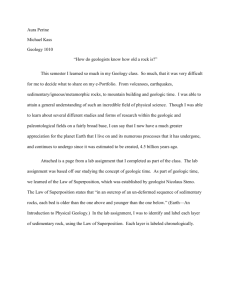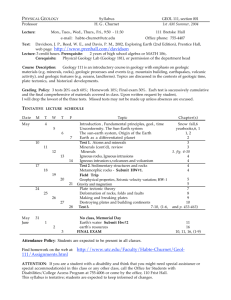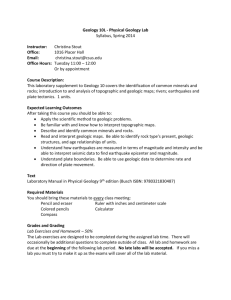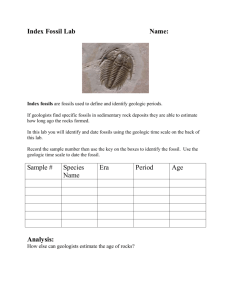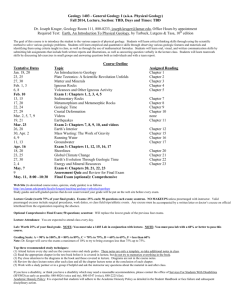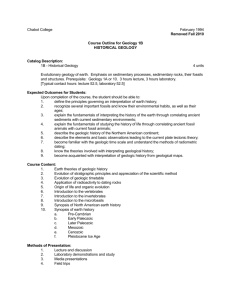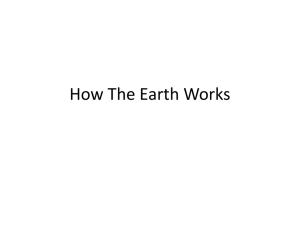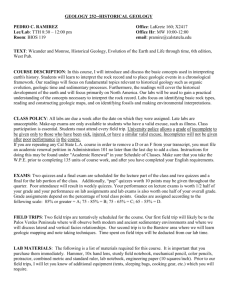Geol 101 Section 1001
advertisement
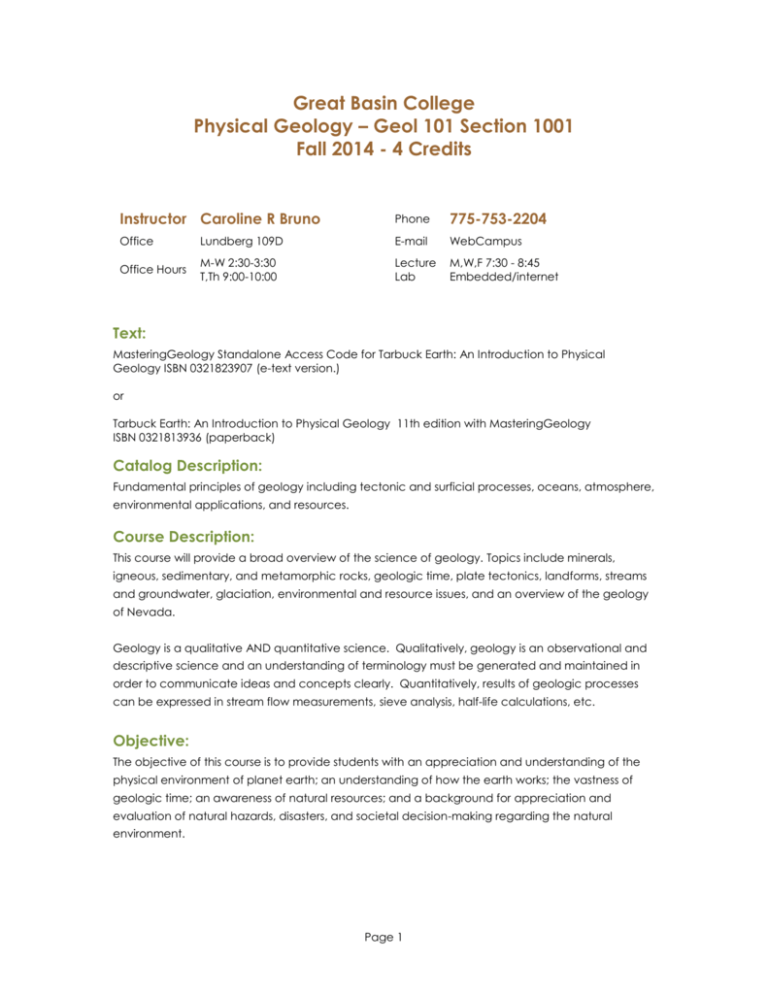
Great Basin College Physical Geology – Geol 101 Section 1001 Fall 2014 - 4 Credits Instructor Caroline R Bruno Phone 775-753-2204 Office Lundberg 109D E-mail WebCampus Office Hours M-W 2:30-3:30 T,Th 9:00-10:00 Lecture Lab M,W,F 7:30 - 8:45 Embedded/internet Text: MasteringGeology Standalone Access Code for Tarbuck Earth: An Introduction to Physical Geology ISBN 0321823907 (e-text version.) or Tarbuck Earth: An Introduction to Physical Geology 11th edition with MasteringGeology ISBN 0321813936 (paperback) Catalog Description: Fundamental principles of geology including tectonic and surficial processes, oceans, atmosphere, environmental applications, and resources. Course Description: This course will provide a broad overview of the science of geology. Topics include minerals, igneous, sedimentary, and metamorphic rocks, geologic time, plate tectonics, landforms, streams and groundwater, glaciation, environmental and resource issues, and an overview of the geology of Nevada. Geology is a qualitative AND quantitative science. Qualitatively, geology is an observational and descriptive science and an understanding of terminology must be generated and maintained in order to communicate ideas and concepts clearly. Quantitatively, results of geologic processes can be expressed in stream flow measurements, sieve analysis, half-life calculations, etc. Objective: The objective of this course is to provide students with an appreciation and understanding of the physical environment of planet earth; an understanding of how the earth works; the vastness of geologic time; an awareness of natural resources; and a background for appreciation and evaluation of natural hazards, disasters, and societal decision-making regarding the natural environment. Page 1 Method of Instruction: This course is primarily a lecture course (Monday, Wednesday, Friday) with embedded labs and online lab activities. Lectures coincide with assigned reading material in the text, and add clarification and examples to the material in the text. The lab is scheduled to coincide with the lecture to add emphasis and “hands-on” experience doing science. Learner Outcomes and Measurement: Learner Outcomes Measurement Apply the principles of scientific inquiry to help Homework, assessments, labs solve geologic problems. Employ critical thinking skills Homework, assessments, labs Read and interpret graphs and data Homework, assessments, labs Demonstrate the quantitative skills needed to Homework, assessments, labs succeed in geology Identify the impacts of science on society Homework, assessments, labs Identify connections between concepts across Homework, assessments, labs Geology Communicate effectively in writing. Assessments, labs Evaluate the credibility of scientific information Homework, assessments, labs from various sources. Evaluation: Tests: There will be four tests during the semester. The tests will relate to the material covered in the course segment prior to the test. The tests are generally short essay with some questions relating to diagrams. If you must miss an exam due to illness, call your professor immediately to make proper arrangements. In case of an unexcused absence, make-up exams are not given. Homework Assignments: Weekly homework assignments are required using Mastering Geography (part of the textbook bundle through the GBC bookstore). The Course ID for Mastering Geology is MGEOLBRUNO34884. Additional instructions are located in the WebCampus assignment area. Lab: Lab is embedded into weekly lectures, homework and online activities. Students are required to complete every lab assignment and lab quiz to pass the course. Students are required to attend one Saturday field trip (TBA) to fulfill the field requirement for the course. Field Notebook Discussions: Students will take photos of geologic features related to weekly material and post them in the discussion area. Students will provide the location, observations and interpretations about the feature presented in their post, and will provide a thoughtful response to a fellow student’s post. Additional instructions are located in the assignment area. Page 2 Current Events Discussions: Students will use the GEOL 101 Twitter feed to comment on how geology is currently impacting our world. Grading: Grading will be based on tests, quizzes, assignments, and labs. All scores will be added together at the end of the semester, and the percentage of the total possible points will determine the lecture grade. Grades will be based on the following divisions: A 95-100% A- 90-94% B+ 87-89% B 84-86% B- 80-83% C+ 77-79% C 74-76% C- 70-73% D+ 67-69% D 64-66% D- 60-63% F <59% A student may receive a “W” grade only if withdrawal occurs by October 27, 2014. To withdraw, the student must inform the instructor verbally or in writing why the withdrawal is taking place, and must formally withdraw through student services. Anyone who does not formally withdraw and does not complete the course will receive an ‘F’ grade. ‘I’ grades for ‘incomplete’ will be given only under the most extenuating circumstances, and only with the prior approval of the instructor. Attendance Policy: Attendance for lecture is highly recommended, although not required. Students MUST complete every lab to pass the course. If you are ill, don’t be a hero. Keep your germs at home instead of passing them on to your classmates and instructor. If you must miss class or lab due to an illness, meet with your instructor to make up the work. Cell Phones: Cell phones must be turned off during quizzes and exams. Please be courteous and refrain from using your cell phone during lecture unless asked to research a topic during lecture. Page 3 Hints for Success: In order to pass this course you MUST actively participate in your education and study! Take good notes during class! Ask questions if you don’t understand the material. Attend study groups offered by your instructor. Read the helpful hints (located on the last page of the syllabus) from previous GEOL 101 students/ Additional Course Information: The instructor will reply to WebCampus emails during posted office hours. If you have an urgent question requiring a timely response during school hours, call the instructor directly at 775-753-2204 or stop by Lundberg 109D. Extra credit opportunities are not available. To maintain articulation with the University of Nevada, Reno core curriculum requirements, two field labs and two labs with controlled variables are included in the schedule. Page 4 Student Conduct Policy: Students are expected to follow the Student Conduct Policy for students in the Nevada System of Higher Education (NSHE) outlined on pp. 28-32 of the 2007-2008 GBC Catalog. Because this is a live class enhanced with WebCampus, students will specifically be held accountable for behaving in a civil and respectful manner toward other students and the professor in all communications in class and online. The college catalog states, “Messages, attitudes, or any other form of communication deemed to be outside the bounds of common decency/civility as judged by common standards of classroom behavior (determined, as they would be in a regular classroom, by the instructor) will not be tolerated” (29). Pay particular attention to those last four words. Any student who behaves rudely to another student or to the instructor will be dropped immediately. During the first week of class, students will be required to respond to an email from the instructor acknowledging that they have read the Student Conduct Policy and understand that they will be dropped from the class for violating it. Academic Honesty Statement: Academic dishonesty, in any form, such as, cheating and plagiarism, will not be tolerated by the instructor AND Great Basin College. Academic dishonesty can result in failing the class, academic suspension, or expulsion. All tests, quizzes, laboratories, and other assignments must be the student’s OWN work. Plagiarism is presenting someone else’s word, ideas or data as one’s own. When a student submits work that includes the words, ideas, or data of others, the source of that information must be acknowledged through complete, accurate, and specific references; and if verbatim statements are included, through quotation marks as well. In academically honest writing or speaking, the students will acknowledge the source whenever: Another person’s actual words are quoted Another person’s idea, opinion or theory is used, even if it is completely paraphrased in the student’s own words Facts, statistics, or other illustrative materials are borrowed, unless the information is common knowledge ADA Statement: The college catalog states, “Great Basin College is committed to providing equal educational opportunities to qualified students with disabilities in accordance with state and federal laws and regulations, including the Americans with Disabilities Act of 1990 and Section 504 of the Rehabilitation Act of 1973. A qualified student must furnish current verification of disability. The ADA Officer, located in Berg Hall, will assist qualified students with disabilities in securing the appropriate and reasonable accommodations, auxiliary aids, and services. For more information or further assistance, please call 775.753.2271” (36). Page 5 Fall 2014 GEOL 101 Course Schedule: Assignment and discussion dates are displayed in WebCampus Week 1–August 25 2 – Sept 1 3 – Sept 8 4 – Sept 15 5 – Sept 22 6 – Sept 29 7 – Oct 6 8 – October 13 9 – October 20 10 - Oct 27 11 – Nov 3 12 – Nov 10 13 – Nov 17 14 – Nov 24 15 – Dec 1 16 – Dec 8 Topics and Exam Dates Labs and Quizzes An Introduction to Geology Plate Tectonics Minerals and Matter Magma, Igneous Rocks Volcanoes Volcanoes Exam 1 Weathering and Soil Weathering and Soil Sedimentary Rocks Metamorphism Geologic Time Crustal Deformation Geologic Time Quiz Earthquakes Exam 2 Earth’s Interior Divergent Boundaries Convergent Boundaries Mass Wasting Running Water Ground Water Deserts and Winds Shorelines Global Climate Change Energy and Mineral Resources Geology of Nevada Reading Plate Tectonics Ch1, Ch2 Min Identification Ch 3 Mineral Quiz Igneous Rocks ID Igneous Rocks Sedimentary Rocks Ch 4, 5 Ch 5, 6 Ch 6, 7 Metamorphic Rocks Half-Life Ch 8, 9 Rock Quiz Geologic Maps Earthquake Intensity and Magnitude Divergent Boundaries Ch 10 Ch 11 Ch 12, 13 Mass Wasting Ch 14, 15 Water resources Ch 16, 17 Glaciers Lamoille Canyon Ch 18 Exam 3 Field Trip Waves, Coasts Ch 19, 20 Topo Maps Ch 21, 23 Exam 4: Wednesday, December 10 Page 6 Handouts Substantiation of the Incorporation of the General Education Objectives into Geology 101: Communication Skills (strong component): Most test questions are short essay in nature, requiring clear communication of the understanding of geologic processes. The use of appropriate sketches and graphs in communicating ideas is promoted. In the lab, written descriptions of the rocks that students identify are required. Lab assignments promote scientific writing. Class discussion (online and live) is encouraged. Critical Thinking (strong component): Quantitative Ability (significant): Several of the labs specifically require measurement, mathematic manipulation of the data, and the creation of graphs. Quantitative relationships are used in creation of topographic maps through interpolation of survey points and in the creation of topographic cross sections. Students learn latitude and longitude (with an introduction to GPS) and the use of the Land Office Grid System (section, township, range). Students are introduced to the use of the Brunton compass in the geologic maps labs, the measurement of planar orientation with strike and dip. The difference in arrival times of p and s waves generated from earthquakes is used to determine the location of earthquakes from seismograph data. Quantitative ability will be measured in many of the laboratory assignments and on exams. Reasoning and Independent Thought (significant): All lab exercises require reasoning and independent thought based on the interpretation of both qualitative and quantitative information. For mineral and rock identification, observations and simple physical tests must be made to determine the unique physical properties and compositions. This information is then interpreted to correctly identify the mineral or rock. There is more reasoning in this exercise than most students realize. The interpretation of landforms represented on topographic maps and geologic structures represented on geologic maps both require reasoning. Many test questions require reasoning taken from the understanding and application of the processes of geology, not just the memorization of terms (though of course, they must know the meanings of the terms too). Scientific Understanding (significant): All principles taught in this course are based on scientific reasoning. All interpretations are given as they are based upon facts. The lab introduces the use of the scientific method and the use of both observational and quantifiable facts in its application. The underlying effects of energy from gravity, stream velocity, internal and solar heat, and other sources are discussed. The chemical nature of rocks and minerals is shown. The scientific basis for evolution shown in the fossil record is reviewed, and its application to the geologic time scale is emphasized. Geologic time and the position of the earth within time and the universe is reviewed. Students are taught that every feature of the earth is the result of specific processes that can be understood and interpreted by those who are knowledgeable of these processes. Scientific Understanding will be measured in laboratory exercises, homework and exams. Personal and Cultural Awareness (moderate component): Sense of the Individual in Society (considerable): This objective is also reflected under the “Sense of Accountability” objective below. We discuss the right of the individual to build anywhere one desires versus societies’ willingness to compensate the individual for losses incurred from natural disasters, especially when a high likely-hood of the disaster is known (examples: building on Page 7 flood plains or barrier islands in hurricane prone areas, etc.). Laboratory exercise cover land use and potential avenues of pollution. A global view of geological processes is given that shows that they have no deference to any race, creed, or cultural factor. Different social attitudes to geologic hazards in different cultures are reviewed. Sense of the Individual in Society will be measured in the Water Resources Laboratory. Sense of the Past (considerable): This class lives deeper in the past than most would probably like to accept as the goal of this objective. We show human history as only a tiny blip on the screen of time. What can be emphasized is the sharp impact of humans on the surface of the planet in a short period of time, but we can also show how insignificant we are at the same time. In addition, the historical basis for the development of important geologic ideas is presented. Examples include the constancy of interfacial angles of crystals being an early evidence of atomic structure, the history of the interpretation of ice ages, the role of geology in the development of evolutionary theory, the development of new technology advancing the state of knowing (such as using radiometric age dating), etc. Finally, the development of human societies, arts, and industry are all intimately related to the utilization of mineral resources through past ages, thus the terms “Stone”, “Bronze”, “Iron”, and “Atomic” ages. The impact of fossil fuels on modern society is discussed. Laboratory exercises, the Geologic Time quiz and exams require students to demonstrate their knowledge regarding geologic time and the past. Sense of Accountability (significant): A common theme throughout much of this course is the interaction between humans and nature, and the personal and social consequences of these interactions. These interactions range from geologic hazards (floods, earthquakes, volcanic eruptions, mass wasting, etc.) through resource utilization (minerals, fossil fuels, ground water utilization, etc.) through the effects of pollution on natural systems (pollution of ground water, global temperature change, etc.). The acts of individuals and society through building and land use planning are discussed, using examples of costs to tax payers (through government reimbursement after “disasters”) when individuals build in flood plains, low coastal areas susceptible to hurricanes, earthquake-prone areas, etc. The question of what rights society has to regulate activities in these kinds of areas is posed. Laboratory exercises, particularly the Water Resources Laboratory and exams require student to demonstrate their knowledge regarding accountability. Appreciation of Fine Arts (some degree): The development of the fine arts in some areas parallels to development and use of mineral resources, and this type of information is presented during the course of the class. Examples are found in the history of pigments and paints (mineral and petroleum based) and the development of ceramics. Modern sculpture relies on mineral and rock resources. Examples of Greek, Roman and Egyptian Art is discussed throughout the chapter on weathering. Appreciation of Fine Arts will be measured using homework relating to chemical weathering through acid rain and sculpture degradation. Personal Wellness (some degree): Personal safety is considered in the discussion of geologic hazards (first reactions to earthquakes, safe places to build or buy homes, etc., are examples). Potential sources of groundwater pollution Page 8 are shown. Exam questions concerning water resources and earthquakes will measure this component. Technological Understanding (some degree): Internet links are shown to sites giving current earthquake reports, past flood data for the United States, etc. GPS units and their use are going to be incorporated into the labs on maps and location. The class is internet enhanced and students will access course materials online. This component will be measured in laboratory exercises involving the Brunton Compass. Page 9 How to Succeed in Geology 101 - By previous Geology 101 students ‘A positive attitude and a willingness to learn is all it takes….keep your ears and eyes at attention when she teaches.’ ‘Study at least 2 hours a week.’ ‘1. Take good notes. 2. Don’t wait until the night before a test to study, start at least 3 days out. 3. Try not to miss a class. 4. Don’t skip school on lab days (usually relates to text and provides a visual on what is taught in class. 5. Understand Bowen’s Reaction Series.’ ‘Read the chapters, pay attention to lecture, take good, thorough notes from lectures, participate in reviews, print out study guides and keys, Study, Study, Study, talk to Carrie if you need to.’ ‘I can say only one word – STUDY!!! If you don’t study you will struggle in this class. Her tests are not very easy. Don’t study the book, study the notes and really pay attention, because she gives the tests on notes and lecture, not the book!!’ ‘Take extremely good notes during lectures. Study notes and then refer to book if more explanation is needed. Ask questions if lost. Go to class every session, you will miss out a lot on the notes and what was said in class.’ ‘Don’t procrastinate! Read the chapters and understand the pictures. Learn all the geology terms and how to use them.’ ‘To not get overwhelmed – make sure you keep up. Read the chapters and have an interest to want to be in here.’ ‘To succeed in geology, it is vital that you pay attention in class! Taking notes during the lecture is very helpful, because most of the information covered in class is directly on the exam. Also, study the diagrams!’ ‘Have fun. Work hard. If you don’t understand, ask the teacher to help you. Go to the study groups. ‘Pay attention to the lectures!!!’ ‘Take advantage of every single learning or studying opportunity available. Learn how geology relates to your life and world --if it is interesting to you, you will learn more readily.’ ‘Form a study group. ‘ ‘Read your book.’ ‘Stay awake and come to class.’ ‘Take good notes. Study your notes. Learn your notes.’ ‘Study more (rock and mineral) samples than those provided in lab.’ ‘Read the chapters thoroughly and take good notes on the PowerPoints.’ ‘Review your notes several times, study hard, and ask questions. Then study some more!!’ ‘Study like crazy every week!’ ‘Come to class everyday and take really good notes.’ ‘Get involved with study groups outside of class.’ ‘Study groups are extremely helpful!’ ‘This class will be easier for you if you take notes and read the book.’ ‘Ask questions.’ ‘A simple way to succeed in geology is to study. ‘ ‘Take interest in the class.’ Page 10
